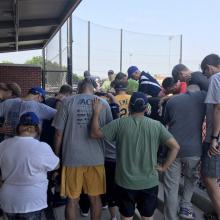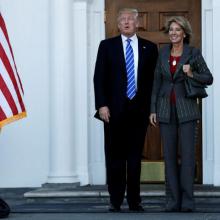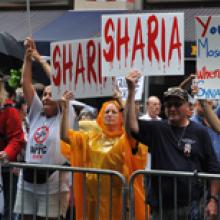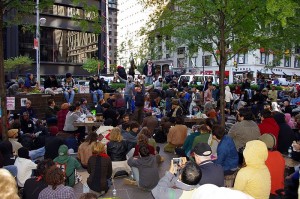Louisiana
MANY CONSIDER LOUISIANA ground zero for the country’s most pressing environmental problems. The risks of living in a state long nicknamed “Sportsman’s Paradise” continue to mount as worsening, climate change-fueled hurricanes threaten its degrading coastlines, which slip away with rising tides. Meanwhile, an ongoing industrial boom endangers the health of residents living along the fence line of some of the major fossil fuel plants that help drive global warming. But for two quite different church communities — one deep in Louisiana’s countryside and the other in the state’s most populous city — the risks present an opportunity to model what’s needed for a resilient and faithful future.
Tucked in the rural remains of Louisiana’s plantation country, just under 500 people, most of them Black, call the small town of Convent, La., home. The 300-year-old community, situated about 50 miles west of New Orleans on I-10, moves with the bend of the winding Mississippi River, which cuts through the entirety of St. James Parish. Convent serves as the parish seat, and many of the families date back generations, descending from people who were enslaved on sugarcane and indigo plantations.
But people aren’t the only ones who reside there. Some of the wide swaths of land once used for plantations began to be sold to chemical companies in the mid-to-late 1900s. On the eastern end of Convent, a trio of industrial plants neighbor each other, spewing pollution. The coal export facility, fertilizer manufacturer, and chlorine manufacturer each silently release their own toxic mix of hazards into the air — and Convent residents like Rev. Roderick Williams breathe that air every day.
Williams believes his neighbors have suffered as a result, as cancer has spread throughout his community and others in St. James while chemical plants proliferated. It’s challenging to attribute a single cancer case to environmental pollution, but Louisiana Tumor Registry data shows that at least one census tract in St. James has a significantly higher rate of cancer than much of the state.
Williams’ hometown of Convent and the rest of St. James Parish sit in the heart of Louisiana’s chemical corridor, an 85-mile stretch of the Mississippi River running from Baton Rouge through New Orleans. The heavily industrialized swath — forged through the most generous property tax exemption program in the nation — has garnered the infamous nickname of “Cancer Alley” due to concerns about the health impact of the more than 200 industrial plants scattered there. A 2021 ProPublica report found that “Cancer Alley” was one of the country’s largest hotspots for toxic air.
Political and religious leaders offered prayers for Rep. Steve Scalise and four others who were injured in a shooting during a GOP congressional baseball practice.
The Democratic team stopped their practice following the shooting on June 14 in Alexandria, Va.
Science and education professionals are increasingly alarmed about the impact Donald Trump’s cabinet picks — many of them evangelical Christians — could have on science standards in public schools.
Candidate Trump repeatedly pledged to end the existing Common Core curricula standards for math and English. Critics worry that could open the door to rethinking science standards, and lead to the teaching of creationism and Intelligent Design, pseudo-scientific notions about Earth’s origins with little or no support from scientists.
While much of America over the past week was focused on Trump vs. Hillary or Ryan Lochte and crew in Brazil, south Louisiana was drowning, almost unnoticed, from severe floods. But local churches sprang into action and became places of refuge with resources to share as those who could help others did.
In a northern Baton Rouge suburb last weekend, Jared Stockstill watched with alarm as the floodwaters rose on his street.
Then he started hearing that rescue workers weren’t able to reach everyone who needed help. Stockstill is the administrator of Bethany Church, a nondenominational megachurch with five campuses in the Baton Rouge area.

Photo via Alton Sterling / Facebook
Police in Baton Rouge, La., shot and killed 37-year-old Alton Sterling after pinning him to the ground in a convenience store parking lot.
Graphic footage of the shooting has circulated online, sparking nationwide outrage and protests.

Image via Protasov AN / Shutterstock.com
In a rebuke to other southern state governments that have passed anti-discrimination laws in recent weeks, Louisiana Gov. John Bel Edwards signed an executive order April 13 to protect LGBT rights in the workplace, reports The Hill. The executive order overturns former Gov. Bobby Jindal’s own executive order that permitted businesses and government agencies to refuse to serve gay and lesbian couples.

Police car, Bennian / Shutterstock.com
A gunman opened fire in a Lafayette, La., movie theater Thursday evening during a showing of Trainwreck, killing two and injuring nine, before turning the gun on himself, according to multiple news reports. Police say they know the identity of the shooter — described as a white, 58-year-old male — but are not yet releasing his name.
While reflecting upon and celebrating Easter, I did quite a bit of thinking about the controversies surrounding so-called “religious freedom” bills that have been popping up recently, most notably Indiana and Arkansas. In a recent interview on the Family Research Council radio program, “ Washington Watch with Tony Perkins," former Arkansas Governor Mike Huckabee discussed the backlash against these two pieces of legislation.
Huckabee asserted that gay-rights activists are seeking the eradication of Christian churches. According to Huckabee, “It won’t stop until there are no more churches, until there are no more people who are spreading the Gospel.”
Christianity has been and continues to be the dominant form of religious practice and expression in America. Often the rhetoric used by members of dominant groups insinuates that when people outside of their dominant group ask for equal rights and the opportunity to participate fully in American life, they are actually seeking to eradicate the existence of that dominant group.
The Supreme Court’s decision to sit out the legal battle over same-sex marriage will — for now, at least — leave the future of laws prohibiting gays and lesbians from marrying in the hands of lower state and federal court judges. But it also almost certainly means the couples challenging those laws are more likely to win in the end.
The court said Oct. 6 that it would not hear appeals from five states whose same-sex marriage bans had been invalidated by lower federal courts. The decision, issued without explanation, will likely lead to recognition of gay marriages in 11 more states. It also allows an avalanche of legal challenges to the remaining bans to keep going forward in state and federal courts, where gay and lesbian couples have overwhelmingly prevailed.
The court’s decision leaves unchanged 20 state laws blocking same-sex unions. Each is already under legal attack, facing challenges in state or federal court, and sometimes both. Challenges to marriage bans already have reached a handful of state appeals courts and the federal appeals courts for the 5th, 6th, 9th and 11th circuits.
Some of those judges had been waiting to see what the Supreme Court would do. The court’s instruction Oct 6. was: Proceed.
A group of Catholic monks can continue selling their handmade caskets after the U.S. Supreme Court declined to hear an appeal from Louisiana funeral directors.
“We really can now move forward without worrying about being shut down,” said Deacon Mark Coudrain, manager of St. Joseph Woodworks in Covington, La. “This is going to affect a lot of other people. A lot of people are going to have opportunities to do things that are their legal right to generate revenue.”
In a little-noticed ruling on Oct. 15, the Supreme Court declined to hear the case between the brothers of St. Joseph Abbey and the Louisiana State Board of Embalmers and Funeral Directors.
As the Creation Care campaign associate at Sojourners, my job is to get people thinking about God’s call for us to care about the creation. Usually, I do that from behind a desk in Washington, D.C., but recently I got to do it from a boat out on the bayou in Louisiana, in a tiny community that has been hit by eight disasters in eight years (seven hurricanes and the Deepwater Horizon oil spill). I took 100 people out to the town of Jean Lafitte, less than an hour from New Orleans, to hear from people who live on the front lines of climate change.
One of the obstacles to igniting a passion about climate change is that it feels so abstract; it feels like a future problem, a global problem. But it’s really a here and now problem. We took folks out on the Louisiana bayou to meet with those who are living in the midst of climate change – people who don’t think of themselves as environmentalists, but who can bear witness to the impact that climate change and our use of dirty energy have had on their lives, personally.
The town of Jean Lafitte is an old and diverse town, a close-knit community where faith is important to many people, including the mayor. It’s a town that sounds a lot like the early Christian church. We were told that homelessness is not a problem there – if your neighbor loses her home, why wouldn’t you take her in? We were told that when the state government showed up two weeks after Hurricane Katrina, the town had recovered so quickly that the government thought the hurricane hadn’t hit them. This community comes together, and because it knows how to survive, it often gets forgotten by government responders and by oil companies like BP.
I always thought of climate change as something that affected developing countries. Through my work at World Renew, an international disaster response and community development organization, I am well acquainted with the devastating effects of changing growing seasons in Africa and environmental refugees in Bangladesh. I probably shouldn’t have been so surprised to learn that there are ecojustice issues here in the U.S. — but I was.
Last week I had the opportunity to tour the town of Jean Lafitte just outside New Orleans. Hosted by Sojourners, it was one of the “Go and See” options during the Christian Community Development Association conference.
Our tour began with a presentation by the Rev. Kristina Peterson and Mayor Tim Kerner at the Jean Lafitte National Historical Park and Preserve. There we learned that since the 1930s, Louisiana has lost a football field of wetlands every 38 minutes. At the current rate, the state will lose an area of wetlands the size of Rhode Island by 2050. According to Peterson, 36 percent of the wetland loss can be attributed to the activities of the oil and gas industry — in particular, the canals they carve out.
North Carolina lawmakers on Wednesday approved a bill to prohibit judges from considering “foreign laws” in their decisions, but nearly everyone agrees that “foreign laws” really means Shariah, or Islamic law.
North Carolina now joins six other states — Oklahoma, Arizona, Kansas, Louisiana, South Dakota, and Tennessee — to pass a “foreign laws” bill. A similar bill passed in Missouri, but Gov. Jay Nixon vetoed it, citing threats to international adoptions.
The bills all cite “foreign laws” because two federal courts have ruled that singling out Shariah — as Oklahoma voters originally did in 2010 — is unconstitutional.
Louisiana faith leaders hand-delivered a letter to Gov. Bobby Jindal this morning, denouncing his proposal to increase sales tax by 47 percent as “unjust” and “regressive.”
The state already has one of the most disproportionate tax systems in the country, with low- and middle-income families paying more than twice the rate in taxes as families whose income totals more than $1 million per year. To raise the sales tax even higher, say leaders, would deal a crushing blow to the poor.
“[W]e are concerned that your plan proposes to use the increased revenue generated by a heavier burden on poor and moderate income families,” the letter reads, “not to fund any of the important needs and services our State faces, but to decrease the tax burden for those members of our community who are most blessed with wealth and resources. That … is unacceptable.”
NEW ORLEANS -- In a sometimes harshly worded ruling, a federal appeals court last week smacked down the Louisiana funeral board's continued attempts to prevent a group of monks from St. Joseph Abbey from selling their hand-crafted caskets.
"The great deference due state economic regulation (does not require) courts to accept nonsensical explanations for naked transfers of wealth," wrote Judges Patrick Higginbotham, Catharina Haynes and Stephen A. Higginson of the 5th U.S. Circuit Court of Appeals on Oct. 23. "We insist that Louisiana's rules not be irrational."
The appellate judges sent the case to the Louisiana Supreme Court, refusing to consider the funeral board's appeal of a lower court ruling that said it was unconstitutional for the state to give funeral directors exclusive rights to sell caskets.
"Simply put, there is nothing in the licensing procedures that bestows any benefit to the public in the context of the retail sale of caskets," U.S. District Court Judge Stanwood R. Duval Jr. ruled in July 2011. "The license has no bearing on the manufacturing and sale of coffins. It appears that the sole reason for these laws is the economic protection of the funeral industry," which he wrote is not "a valid government interest."
After Hurricane Katrina destroyed the abbey's timberland outside Covington, La., a longtime a source of revenue, the monks decided to sell their handmade caskets as a way to supplement their income. The abbey invested $200,000 in St. Joseph Woodworks and sold two types of caskets, "monastic" and "traditional," priced at $1,500 and $2,000 respectively.
"To be sure, Louisiana does not regulate the use of a casket, container, or other enclosure for the burial remains; has no requirements for the construction or design of caskets; and does not require that caskets be sealed," the appeals court ruled.
Seven years after Hurricane Katrina toppled a nearby floodwall and drowned their synagogue, and after a seven-year journey praying in hotel meeting rooms, then in rooms borrowed and rented from another congregation, the 100 or so families of Congregation Beth Israel are finally home.
The wandering congregation moved into their new synagogue in suburban Metairie on Aug. 26, three days before the Katrina anniversary and two days before Hurricane Isaac hit landfall in Louisiana.
With a short parade that included a New Orleans brass band, clergy and friends ceremonially carried their five sacred Torahs to their home in Beth Israel’s new ark.
There’s a passage from Hebrew Scripture from the Song of Solomon carved into the ark’s face: “Mighty waters cannot extinguish our love.”
Louisiana State Rep. Valarie Hodges used to be a big fan of school vouchers.
“I liked the idea,” she explained, “of giving parents the option of sending their children to a public school or a Christian school.”
Hodges got a First Amendment reality check when she discovered that Christian schools wouldn’t be the only religious schools getting tax dollars.
“Unfortunately, it (vouchers) will not be limited to the Founders’ religion,” she said in June. “We need to ensure that it does not open the door to fund radical Islam schools. There are a thousand Muslim schools that have sprung up recently. I do not support using public funds for teaching Islam anywhere here in Louisiana.”
Although Gov. Bobby Jindal’s voucher plan passed last month without her support, Hodges vowed to keep looking for alternative ways to “support funding for teaching the fundamentals of America’s Founding Fathers’ religion, which is Christianity, in public schools or private schools.”
Beyond the fact that some of the Founders were not Christian, Hodges appears confused – to put it mildly – about the implications of the First Amendment’s guarantee of religious freedom for all, including American Muslims.
A group of Catholic monks who sued for the right to sell handmade caskets will head back to court this week, fending off an appeal from the state funeral industry after a federal judge last year struck down a state law that permitted only licensed funeral directors to sell coffins.
Three members of the 5th U.S. Circuit Court of Appeals will hear arguments June 7 n the case of the monks of St. Joseph Abbey versus Louisiana funeral homes.
The monks wanted to sell handmade cypress caskets that are made at their wood shop without paying the expensive fees and meeting the stringent requirements to obtain certification from the Louisiana Board of Embalmers and Funeral Directors. The abbey has said it counts on the casket sales to help finance medical and educational needs for more than 30 monks.
Last July, U.S. District Judge Stanwood R. Duval ruled that the state statute unfairly shielded a funeral industry monopoly to the detriment of consumers.
We've compiled a list of links where you can learn more about the genesis of the #OccupyWallStreet movement, including links to news reports, organizations involved in formenting the movement and local groups in every state where you can get involved close to home (if you don't live in Lower Manhattan.)














